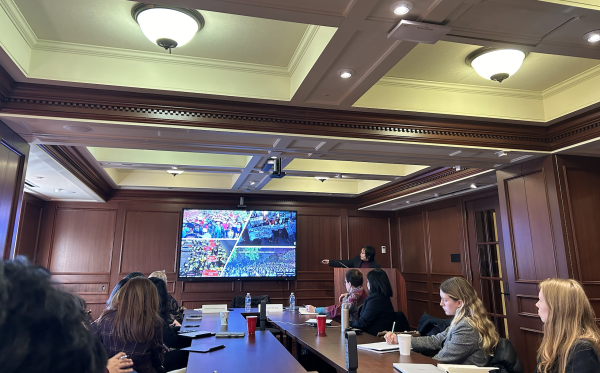Zin Mar Aung, Myanmar’s shadow minister of foreign affairs, discussed life under military rule and Myanmar’s quest for democracy in a Jan. 29 roundtable discussion.
Aung was elected to the country’s parliament in 2016, a position she held until the 2021 military coup when she assumed her current position in the cabinet of the National Unity Government (NUG), which has served as the country’s shadow government since a February 2021 coup d’etat. She spoke at Georgetown University with Melanne Verveer (SLL ‘66, GRD ‘69), the executive director of the Georgetown Institute for Women, Peace and Security (GIWPS).
A military junta has ruled Myanmar since the 2021 coup, exiling many members of the previous democratic government, including Aung, and causing an ongoing civil war between the military junta and the People’s Defense Force (PDF). The NUG backs the PDF’s goal to mobilize against the military and advocates to restore democracy and humanitarian rights to the country.
At the event, Aung emphasized the Burmese people’s resilience against the military junta, calling it the defining feature of the current revolution as the country’s diverse populations, including a variety of ethnic groups, unite around a common goal of restoring democracy to Myanmar.
“This rejection is united. Not just only in young generations, not just only in one party, one group but also many ethnic groups across my country in unified visions of a federal democratic state,” Aung said at the event. “While we are acutely aware of the many areas needed for improvement, we also are constantly reminded that our struggle is a gradual process, and that achieving consensus in our large, diverse and inclusive coalitions requires general consultations.”
Aung started her political career as a student activist protesting against military rule before being arrested and held as a political prisoner for 11 years, nine of which were spent in solitary confinement. After her release from prison in 2009, she founded Rainfall, an organization dedicated to the empowerment of women and democracy.
Verveer introduced Aung at the event. She said Aung’s resilience has persisted throughout her activism and political career, recalling an interaction between Aung’s father and a local reporter.

“It seems like instead of trying to have a better life in many ways, the comforts of life, and leaving all that behind her, she immediately started to be engaged again,” Verveer said in introductory remarks at the event. “And one of the local reporters I remember asking her father, ‘How can this be? You had to live through the horrors of your daughter in prison for 11 years, and she’s out there again.’ And I remember his response was, ‘Yes, she is my daughter, but she belongs to the country.’
“Zin Mar has really belonged to Burma in the way of an activist over all of these years,” Verveer added.
Aung spoke of the gains the PDF and the NUG have made against the military junta, as well as her hopes for a more democratic vision for the country. She said the PDF has retaken key townships in the territory and is making progress towards victory.
“It is three years from the coup, and I am here to tell you that we have not been crushed and that we are pushing military from more and more territory, and that we still believe in our dream of a better Myanmar,” Aung said. “We know that Myanmar will be free in a decentralized and federal democracy.”
Verveer said the situation in Myanmar since the coup three years ago entails abusive and dangerous conditions prevalent for both the opposition leaders, such as Aung, and ordinary civilians.
“It’s been days of just one horrible headline after another. Mass arrests, imprisonments, killings, destruction of the country, many having to leave. She is essentially living in hiding,” Verveer said, referring to Aung.
Aung said the NUG desperately needs humanitarian assistance in the form of international aid, expressing a desire for cooperation with other countries and United Nations (U.N.) agencies, who continue to work with the military junta.
“We are also providing humanitarian assistance as a government, like the education, healthcare and basic needs that we provide to our people,” Aung said. “But we do not have enough support from the international community, including U.N. agencies.”
“That is why I am here in Washington, D.C. and other capitals, to advocate, think about not just only engaging with the military junta, but also working with our ethnic and democratic alliances,” Aung added.
Aung said she is hopeful for Myanmar’s future as the NUG tries to promote democracy and protect its citizens’ welfare.
“This is a common ground, common visions and common objective of our federal democratic forces, and this is what we are working for and struggling for,” Aung said. “Even in that kind of difficult and horrible situation, we have our own visions, and we have a future, and we are quite confident in our future.”








